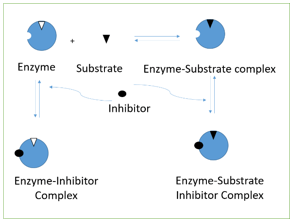Question

a.
competitive
b.
non-competitive
c.
product
d.
uncompetitive
Posted under Enzyme Technology
Interact with the Community - Share Your Thoughts
Uncertain About the Answer? Seek Clarification Here.
Understand the Explanation? Include it Here.
Q. The following diagram represents _______________ inhibition.
Similar Questions
Explore Relevant Multiple Choice Questions (MCQs)
Q. In the following diagram, which inhibition is represented?
View solution
Q. In the following diagram, which kind of inhibition is represented?
View solution
Q. The following graph represents the effect of ____________ on activity of an enzyme catalyzed reaction.
View solution
Q. What does the following graph represent?
View solution
Q. In the following diagram, what does enzyme Z represent?
View solution
Q. Loss of activity which may be restored by the removal of inhibitor is referred to as ___________
View solution
Q. Inhibition of lactase by galactose is an example of which kind of inhibition?
View solution
Q. The rate equation for _______________ inhibition is given by \(V=\frac{V_{max} [S]}{K_m (1+\frac{[P]}{K_p})+[S]}\).
View solution
Q. The following rate equation is given by ___________ inhibition.
\(V=\frac{\left (\frac{V_{max}}{1+\frac{[I]}{K_i’}}\right ) [S]}{\left (\frac{K_m}{1+\frac{[I]}{K_i’}}\right )+[S]}\)
View solution
Q. Mercury causes irreversible inhibition.
View solution
Q. If I = Kᵢ = Kᵢ‘, then what will happen to Vₘₐₓ and Kₘ when inhibitor acts non-competitively?
View solution
Q. What happens to Vₘₐₓ and Kₘ in case of uncompetitive inhibition when I = Kᵢ‘?
View solution
Q. Which of these is correct for mixed inhibition?
View solution
Q. In competitive inhibition, what happens to Vₘₐₓ and Kₘ if [I] = Kᵢ?
View solution
Q. The __________ inhibition gives the following rate equation.
\(V=\frac{V_{max} [S]}{K_m+[S](1+\frac{[S]}{K_s})}\)
View solution
Q. ______________ inhibition represent the following rate equation.
\(V=\frac{\left (\frac{V_{max}}{1+\frac{[I]}{K_i}}\right )[S]}{K_m+[S]}\)
View solution
Q. Inhibition of invertase by sucrose falls into which category of inhibition?
View solution
Q. Uncompetitive inhibition is most noticeable at low substrate concentration and can be overcome at high substrate concentration.
View solution
Q. The following rate equation represents _____________ inhibition.
\(V=\frac{V_{max} [S]}{K_m (1+\frac{I}{K_i})+[S]}\)
View solution
Q. Substances which reduce the rate of enzyme catalyzed reactions are known as ____________
View solution
Recommended Subjects
Are you eager to expand your knowledge beyond Enzyme Technology? We've handpicked a range of related categories that you might find intriguing.
Click on the categories below to discover a wealth of MCQs and enrich your understanding of various subjects. Happy exploring!








